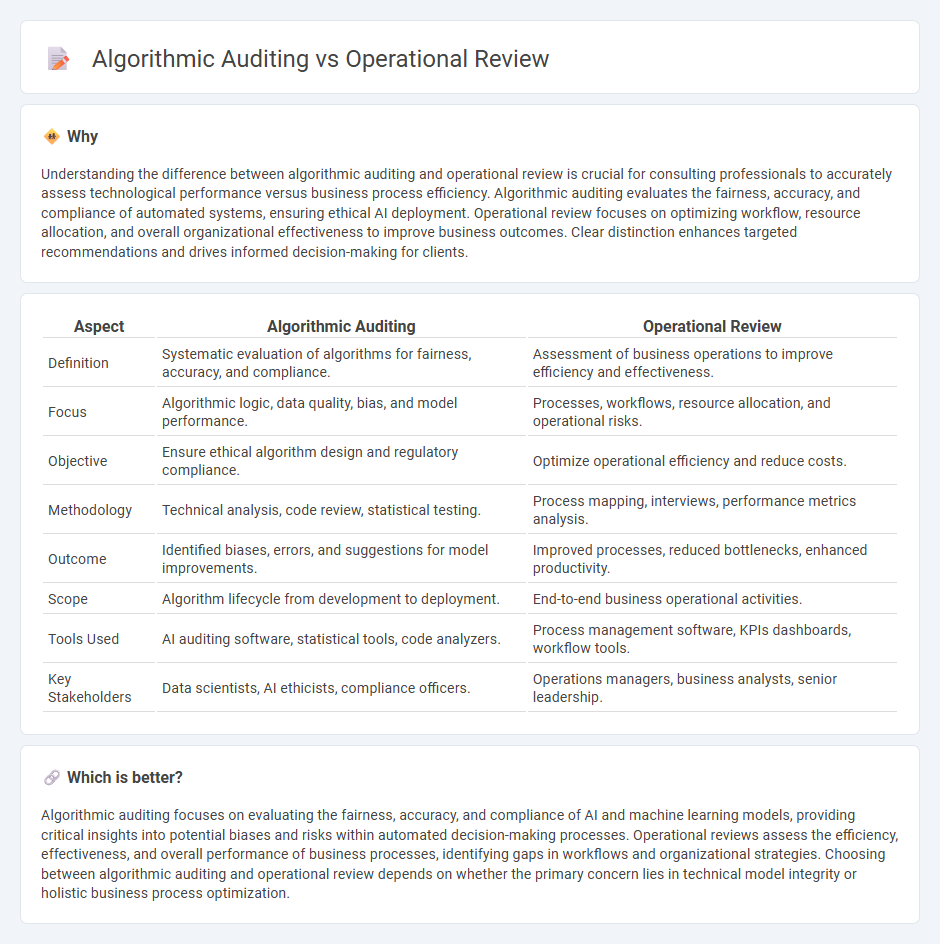
Algorithmic auditing focuses on evaluating the transparency, fairness, and compliance of automated decision-making systems within organizations. Operational review examines the efficiency, effectiveness, and risk management of business processes and workflows to optimize overall performance. Explore the differences to enhance your consulting strategies and drive impactful results.
Why it is important
Understanding the difference between algorithmic auditing and operational review is crucial for consulting professionals to accurately assess technological performance versus business process efficiency. Algorithmic auditing evaluates the fairness, accuracy, and compliance of automated systems, ensuring ethical AI deployment. Operational review focuses on optimizing workflow, resource allocation, and overall organizational effectiveness to improve business outcomes. Clear distinction enhances targeted recommendations and drives informed decision-making for clients.
Comparison Table
| Aspect | Algorithmic Auditing | Operational Review |
|---|---|---|
| Definition | Systematic evaluation of algorithms for fairness, accuracy, and compliance. | Assessment of business operations to improve efficiency and effectiveness. |
| Focus | Algorithmic logic, data quality, bias, and model performance. | Processes, workflows, resource allocation, and operational risks. |
| Objective | Ensure ethical algorithm design and regulatory compliance. | Optimize operational efficiency and reduce costs. |
| Methodology | Technical analysis, code review, statistical testing. | Process mapping, interviews, performance metrics analysis. |
| Outcome | Identified biases, errors, and suggestions for model improvements. | Improved processes, reduced bottlenecks, enhanced productivity. |
| Scope | Algorithm lifecycle from development to deployment. | End-to-end business operational activities. |
| Tools Used | AI auditing software, statistical tools, code analyzers. | Process management software, KPIs dashboards, workflow tools. |
| Key Stakeholders | Data scientists, AI ethicists, compliance officers. | Operations managers, business analysts, senior leadership. |
Which is better?
Algorithmic auditing focuses on evaluating the fairness, accuracy, and compliance of AI and machine learning models, providing critical insights into potential biases and risks within automated decision-making processes. Operational reviews assess the efficiency, effectiveness, and overall performance of business processes, identifying gaps in workflows and organizational strategies. Choosing between algorithmic auditing and operational review depends on whether the primary concern lies in technical model integrity or holistic business process optimization.
Connection
Algorithmic auditing evaluates the fairness, accuracy, and compliance of algorithms used in business processes, ensuring they operate without bias or error. Operational review assesses the overall efficiency and effectiveness of these processes, identifying areas for improvement in workflow and resource allocation. Together, they provide a comprehensive analysis that enhances decision-making, risk management, and operational integrity within consulting engagements.
Key Terms
**Operational Review:**
Operational review evaluates organizational processes, compliance, and performance metrics to ensure efficiency and risk management, emphasizing human decision-making and workflow effectiveness. It identifies gaps in operational controls and recommends improvements based on qualitative and quantitative assessments within a business context. Explore in-depth insights to enhance your operational governance framework.
Process Optimization
Operational reviews emphasize evaluating and improving existing business processes through data analysis and stakeholder feedback to enhance efficiency and reduce costs. Algorithmic auditing specifically assesses the fairness, accuracy, and compliance of automated decision-making systems to identify biases and risks that may impact outcomes. Explore more to understand how integrating these approaches can optimize both organizational workflows and algorithmic transparency.
Performance Metrics
Operational reviews assess overall system effectiveness by examining key performance indicators such as throughput, uptime, and user satisfaction, ensuring that processes align with organizational goals. Algorithmic auditing focuses specifically on evaluating predictive accuracy, bias detection, and fairness metrics within machine learning models, aiming to identify potential ethical and legal concerns. Explore detailed methodologies and best practices for optimizing performance metrics in both approaches.
Source and External Links
How to carry out an Operational Review - Denizon - An operational review involves six key steps including initial management meetings to identify issues and tailor the audit, ensuring performance evaluation aligns with organizational goals and resources.
What are Operational Reviews - Denizon - Workforce Management - Operational reviews are in-depth, objective evaluations of an organization's segment or whole, assessing compliance, effectiveness, problem areas, and opportunities to improve profit and reduce costs.
Strategy Reviews vs. Operational Reviews - Dummies.com - An operational review deeply examines business operations like communication, procedures, and profitability, distinct from strategy reviews which focus on strategic goal progress and high-level planning.
 dowidth.com
dowidth.com